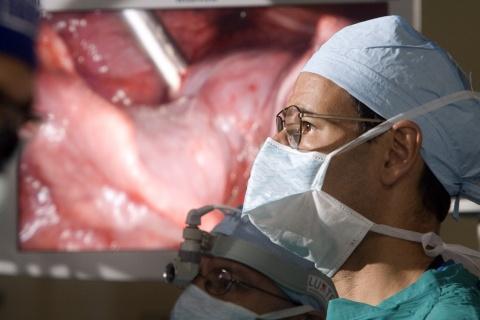
Duke thoracic surgeon partners with universities in China to teach minimally invasive technique for the treatment of lung cancer
As a visiting professor in China 10 years ago, thoracic surgeon Dr. Thomas D’Amico introduced a novel surgical procedure that was showing tremendous benefits in cancer patients back home at Duke University Medical Center.
For over 20 years, Dr. D’Amico, Gary Hock Professor of Surgery, Division of Cardiovascular and Thoracic Surgery, has pioneered the use of video-assisted thoracoscopic surgery (VATS) lobectomy to treat lung and esophageal cancer, a minimally invasive method that uses a miniaturized video camera inserted via small incisions to visualize the chest cavity.
Developed in the 1990s, thoracoscopic lobectomy obviates the need for large incisions in the chest and rib retraction to access the chest cavity, which results in less pain and a quicker recovery time for patients.
However, this technique is highly complex and requires the surgeon to have a high level of expertise.
“We use minimally invasive thoracoscopic lobectomy in 80–90% of lung cancer cases at Duke,” says Dr. D’Amico. “But only 50% of surgeons use this technique worldwide because it’s a difficult procedure to learn and master, and many surgeons are not exposed to the technique during training.”
To remedy this deficit in training, Duke welcomed the first visiting scholars from China 10 years ago to participate in a new program designed to educate surgeons from overseas on the most recent advances in minimally invasive thoracic surgery. Since then, Duke has accepted several visiting scholars from China each year who spend 1–12 months observing cases, conducting clinical research, and attending teaching conferences. More than 70 surgeons from China have visited Duke in this Visiting Scholar position in addition to surgeons from Korea, Japan, Italy, Spain, Denmark, Turkey, Germany, Brazil, Argentina, Colombia, Ecuador, Canada, India, and Singapore.
Additionally, Dr. D’Amico travels to China three times a year to teach VATS to surgeons at universities throughout China.
Five years ago, this training program gave rise to the Asian Masters of Minimally Invasive Thoracoscopy, an annual conference in Shanghai, China, where course participants from all over the world can receive specialized training from international experts.
Dr. D’Amico believes VATS is becoming safer for patients and easier to teach with improved optics and instrumentation.
“This procedure could potentially be used with parallel technologies with independent applications, such as stapling, energy sources, simulation, and robotics,” says Dr. D’Amico.
In addition to the annual courses in China, Dr. D’Amico also teaches this method in Brazil, Spain, England, Scotland, Turkey, Canada, Denmark, France, Bolivia, Peru, India, and Colombia. By disseminating this knowledge beyond Duke, the program aims to improve health globally.